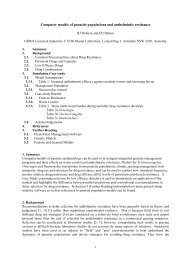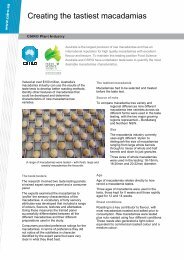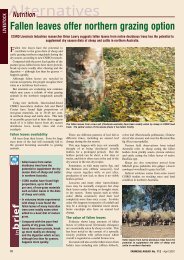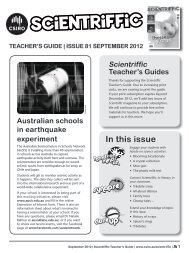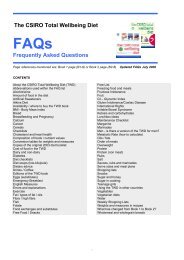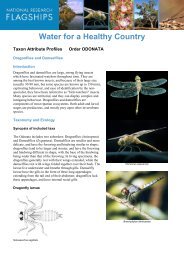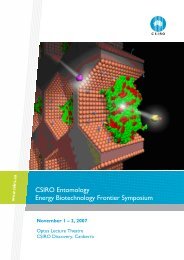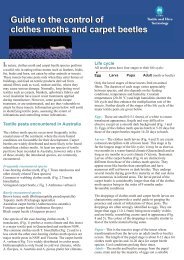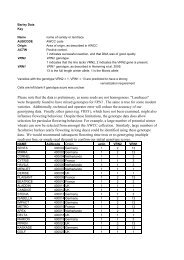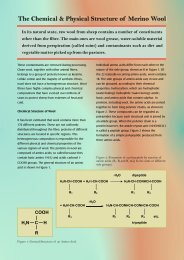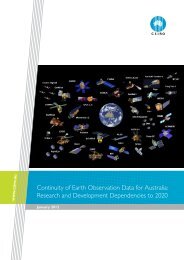WfHC - cover page (not to be used with pre-printed report ... - CSIRO
WfHC - cover page (not to be used with pre-printed report ... - CSIRO
WfHC - cover page (not to be used with pre-printed report ... - CSIRO
Create successful ePaper yourself
Turn your PDF publications into a flip-book with our unique Google optimized e-Paper software.
Marcus Bar<strong>be</strong>r: Is that where Kowanyama‟s rain comes from or does it come from a<strong>not</strong>her<br />
place.<br />
Philip Yam: I think they come from here, right through there.<br />
---------------------------------------<br />
Marcus Bar<strong>be</strong>r: Do they get as much rain up there at Oriners as you get down here [at<br />
Highbury]? Is it drier?<br />
Colin Hughes: No, I wouldn‟t say it is drier. I‟d say it probably <strong>be</strong>, at that latitude up north, it<br />
would <strong>be</strong> probably getting on average an inch more than we get here. For every latitude<br />
you go north you can add on a couple of inches.<br />
---------------------------------------<br />
Marcus Bar<strong>be</strong>r: Is it drier up there or wetter? We got no rain gauges up there.<br />
Philip Yam: You get a lot a rain. Sometimes you get rain up there in the winter <strong>to</strong>o.<br />
Marcus Bar<strong>be</strong>r: Do you get rain down here [at Kowanyama] in the winter time?<br />
Philip Yam: Here <strong>not</strong> much. But up there you will get a big one. It can rain for couple of<br />
days up there. Just showers you know, <strong>not</strong> very heavy. But it will go for a couple of days.<br />
Marcus Bar<strong>be</strong>r: Where does that rain come from? Does it come from the east?<br />
Philip Yam: Yes, it always comes from the east.<br />
Marcus Bar<strong>be</strong>r: Is that the same for the big monsoons, or do they come from a<strong>not</strong>her<br />
direction?<br />
Philip Yam: Yes, I think it‟s the same, <strong>be</strong>cause you get rain up there through the winter.<br />
Sometimes it gets cold up there during the winter, very cold.<br />
Marcus Bar<strong>be</strong>r: Could that <strong>be</strong> one reason why the ti tree like it more?<br />
Philip Yam: Probably. A lot of that area still got moisture in the ground.<br />
---------------------------------------<br />
They get that early s<strong>to</strong>rm <strong>be</strong>fore us, for some reason. Down in this country here, down<br />
<strong>to</strong>wards Strathmay country, they get early s<strong>to</strong>rms <strong>be</strong>fore we get it, on the east coast.<br />
Fred Coleman<br />
---------------------------------------<br />
Marcus Bar<strong>be</strong>r: Is the rain similar across all of those stations- Koolatah, Oriners, Dixie?<br />
Cecil Hughes: When the s<strong>to</strong>rm season‟s on you might 3 or 4 inches over there, then over<br />
here there‟s <strong>not</strong>hing. But when the monsoons come down, and they usually come down,<br />
well then the rain is s<strong>pre</strong>ad over the whole area. Then there‟s <strong>not</strong> much difference<br />
<strong>be</strong>tween the rains down near Koolatah and up at Oriners <strong>be</strong>cause the main rain comes<br />
from the monsoons and that <strong>cover</strong>s everything. Some years the monsoon is very weak or<br />
does <strong>not</strong> come down well you get back <strong>to</strong> s<strong>to</strong>rms. There might <strong>be</strong> more s<strong>to</strong>rms here than<br />
there is there or here and there.<br />
Marcus Bar<strong>be</strong>r: So in a weak monsoon year, then you might get more patchy rain where<br />
one place might get a few big s<strong>to</strong>rms and the other ones don‟t<br />
Cecil Hughes: That‟s right.<br />
Marcus Bar<strong>be</strong>r: So it might <strong>be</strong> a bad monsoon but Oriners or Dixie might get three s<strong>to</strong>rms<br />
that year and it will <strong>be</strong> <strong>be</strong>tter there than elsewhere?<br />
Cecil Hughes: That‟s right.<br />
Marcus Bar<strong>be</strong>r: But when the monsoons come properly, then it is consistent?<br />
Cecil Hughes: Consistent right across<br />
Working Knowledge at Oriners Station, Cape York<br />
40




